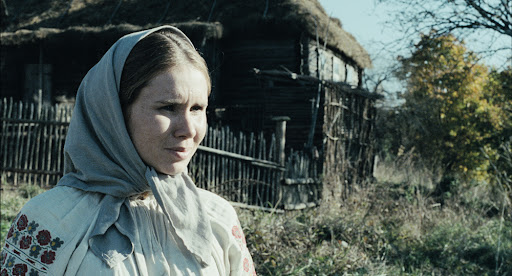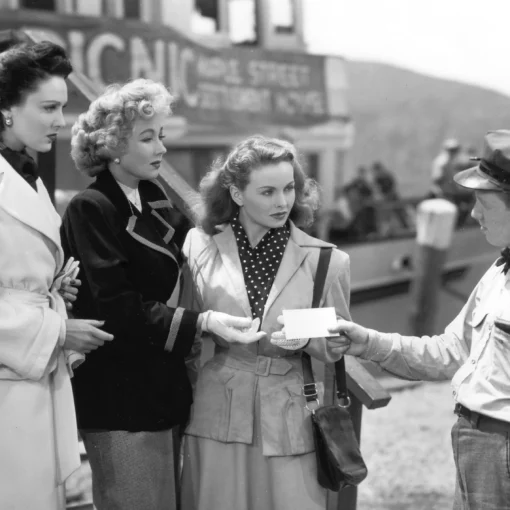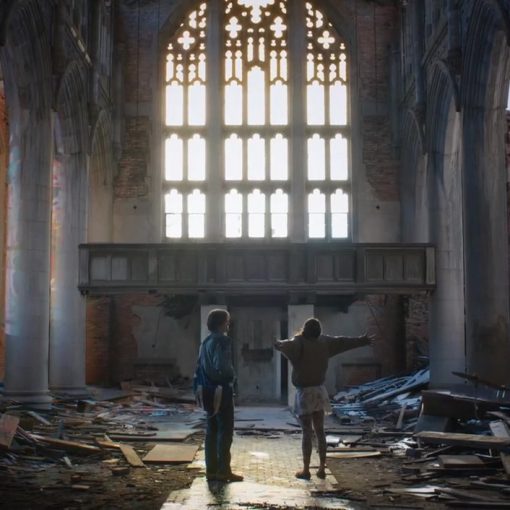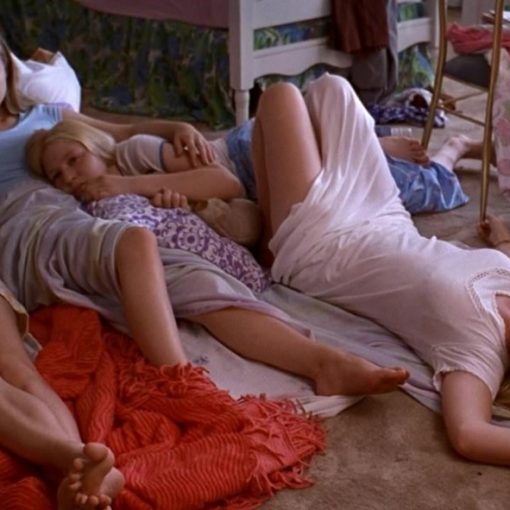#52FilmsByWomen
After four days of July, the #52FilmsByWomen ‘o meter (™) was already at +4 (although to be fair one was a 25 minute documentary). That should make it no surprise that this is going to be a fairly long post. I guess sometimes you just have too much time, and too many films to watch. I can also tick off a few more countries from which I’ve seen a film. Cyprus was new, and I think Bulgaria might be new as well. At the end of the year I think I may no longer contain my love for useless stats and see if I can combine that with my love for lists. I’ve been going through some of the previous posts and I noticed how few films were actually from Hollywood. It’s not for a lack of trying, though.
Prior posts
- #52FilmsByWomen – January
- #52FilmsByWomen – February
- #52FilmsByWomen – March
- #52FilmsByWomen – April
- #52FilmsByWomen – May
- #52FilmsByWomen – June
Watched
- The Diary of a Teenage Girl
- The Lesson (Urok)
- Laloux Sauvage – MUBI
- Evaporating Borders – MUBI
- The Dry Valley (Sukhodol)
- Mikey and Nicky – MUBI
- Olympia I – Festival of the Nations – DVD
- Olympia II – Festival of Beauty – DVD
So now what? 14 films remaining to complete the #52FilmsByWomen challenge, and five more months to do it in. There’s so much I still want to see or to try and find. There’s nothing much of interest to me on MUBI right now, but you never know what they will throw at you. I really want to try to find a Japanese film that I can watch. I haven’t seen any yet and as lover of Japanese cinema I find that entirely unacceptable. Whether or not I can manage that within a month I don’t know though. Masters of Cinema is releasing Naomi Kawase’s Sweet Bean (An) sometime soon, so I’ll probably get that no matter what.
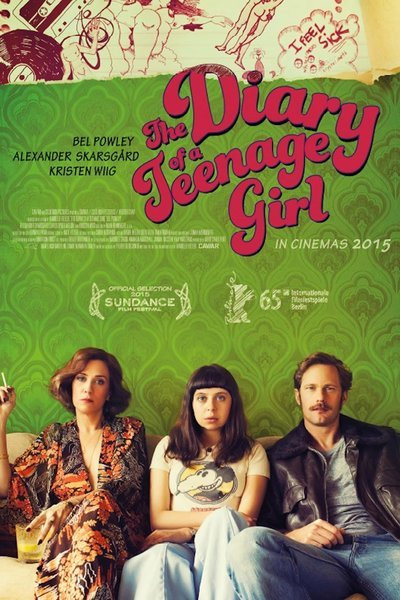 | Original title: The Diary of a Teenage Girl |
| Year: 2015 | |
| Director: Marielle Heller | |
| Duration: 102 min. | |
| Genres: Drama, Romance |
Meet Minnie. A screwy girl who is underage and has sex with her equally screwy mother’s boyfriend. She has sex, manipulates the guy into more sex. Then there’s some sex, some bitching about not getting laid enough, makeup sex, sigh… What’s the point here? She does some drawing, presumably to be able to employ an animator to do some fiddling with a pencil. The girl isn’t likable, the mother isn’t likable, the guy is a bit but he’s a sick bastard, her best friend is a slut (pardon my French). Given the 6.9 rating by a good number of people I must be missing something, or I’m not, but either way this film is completely lost on me. Last month the first film I saw was the best, now it is one of the worst.
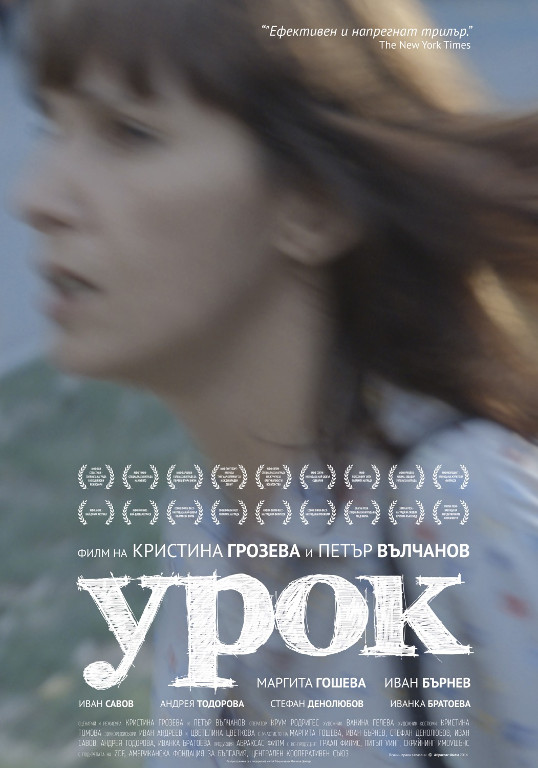 | Original title: Urok |
| Year: 2014 | |
| Director: Kristina Grozeva | |
| Duration: 111 min. | |
| Genre: Drama |
And then I found myself watching a Bulgarian film. One that perfectly displays how stupid people must live. The main couple in this story, Nada/Nadya/Nadezhda or whatever her name is and her husband (and their little girl) are in a bit of a jam thanks to hubby dearest. He’s neither a bad person nor a very bright light. He spent all their money on a carburetor for a broken van, instead of paying off the loan he really should have paid off with that money. It is only when they get an eviction notice of three days that his wife finds out. Things quickly go from bad to worse. Every single thing these people do seems to be the stupidest thing they could possibly do In the meanwhile Nadya has a job as an English teacher. One day a wallet is stolen in class, but nobody is admitting to doing it. She decides to try and teach the kids a lesson about how stealing is bad, but will she be able to prevent going astray herself as her troubles pile up? Overall this was a fine film. I felt that at times it was stretching the boundary of being a believable story, but it was all right.
 | Original title: Laloux Sauvage |
| Year: 2010 | |
| Director: Florence Dauman | |
| Duration: 25 min. | |
| Genre: Documentary |
I watched this short documentary after watching Les Escargots (The Snails) on MUBI. That’s a short by Rene Laloux (a male director, best known for Planète Sauvage). I really like his weird style and when I saw they were also showing this mini-doc I immediately watched it afterwards. It starts off on a bit of a false note with Laloux talking about fairies and chances.. But luckily it soon turns into a quick history of his career and how he worked a lot with mentally deranged people. I didn’t know about that, but it can’t come as a real surprise if you’ve seen any of his work. But back to the doc. I liked the content all right, but there is really nothing of interest to note from a direction point of view. In fact, it isn’t really all that interesting, so unless you like the work of Laloux and are interested to know a bit more about him, don’t bother with this. On the other hand, if you want to see something weird, say Les Escargots, you might find it here.
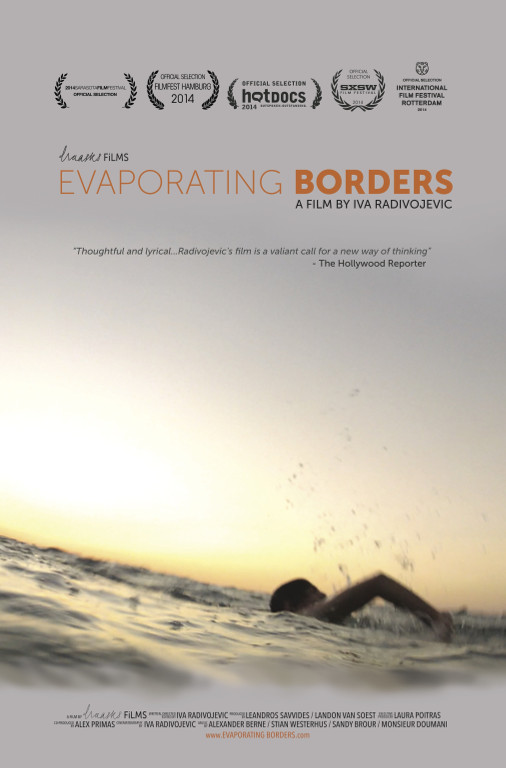 | Original title: Evaporating Borders |
| Year: 2014 | |
| Director: Iva Radivojevic | |
| Duration: 73 min. | |
| Genre: Documentary |
Evaporating Borders is a documentary about Cyprus and its issues with immigrants, both legal and illegal ones. It was an interesting look into how people in another country look at the issues people over here are also talking, discussing, shouting, protesting and fighting about. The documentary was directed, narrated and written (?) by Iva Radivojevic, an immigrant herself (fled from Yuguslavia in the 90’s), but one who is integrated for the most part. It seems to offer her a good perspective on both sides of the situation. It’s fairly obvious that she is what we’d call a lefty as the overall sentiment of the documentary favours that side. The only thing I didn’t really understand is what the point of this documentary was. She offers very little food for thought or potential solutions, as she admits she has none. That leaves the whole thing a little empty, if not still an interesting look into life on Cyprus. They have the same nationalist crazies, fanatics on both sides of the spectrum and so on. But that’s all, and so I don’t think I’ll remember much about it in a few months time.
While re-reading and reviewing this post just prior to publishing it I read what I wrote just after seeing Evaporating Borders. I hate to say it but I was right. To be honest I can’t really remember a thing about it except from some rough outlines of what it was about. It’s a shame, because it really wasn’t a bad doc to watch. I did give it a 7.1, but it just doesn’t seem to stick with you. Stories about this sort of thing really should though, or at the very least they should make you stop and think about things for a while. This one did neither, so while it was well crafted and had some good visuals, it really kind of missed the mark.
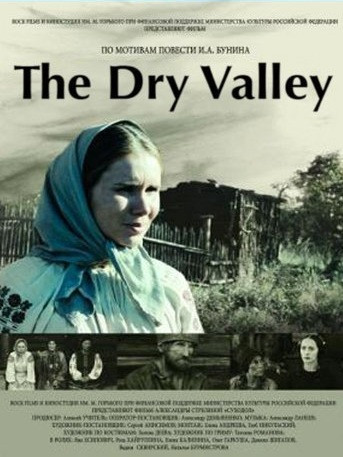 | Original title: Sukhodol |
| Year: 2011 | |
| Director: Aleksandra Strelyanaya | |
| Duration: 99 min. | |
| Genre: Drama |
Watching this Russian film it reminded me a little of the way in which Andrei Tarkovsky shot his films. The story telling is very moody and poetic, and it sometimes leaves you wondering what is going on exactly. But while you’re trying to wrap your head around things the director creates a string of beautiful shots and intense scenes. Another parallel with Tarkovsky is that Aleksandra Strelyanaya also both wrote and directed her film. It may not be as good as a Tarkovsky, but then again very little is. Sukhodol, or The Dry Valley, is about a young girl servant at a country house of weird people of nobility. It’s in part a coming of age story of the girl, but it also shows the slow decay of the area. This was a lovely debut film and I’d like to see more, but it appears that for now I should be happy to have seen this film at all.
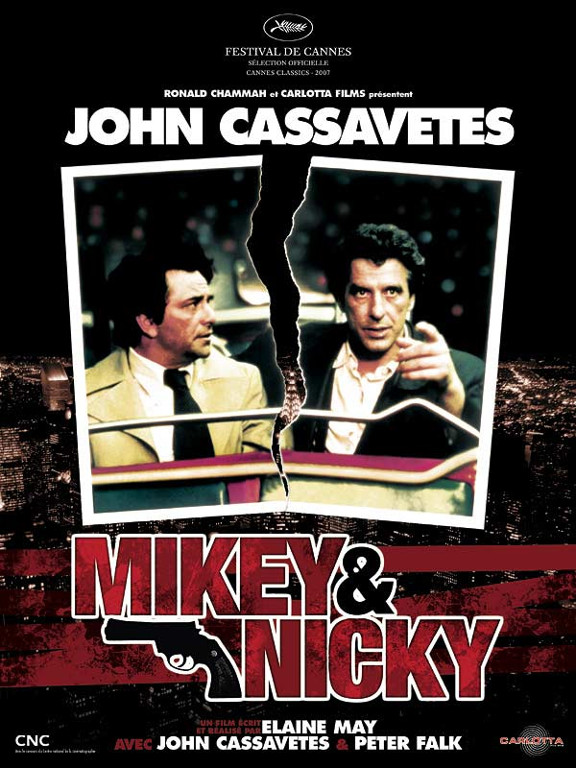 | Original title: Mikey and Nicky |
| Year: 1976 | |
| Director: Elaine May | |
| Duration: 119 min. | |
| Genres: Crime, Drama |
Last month I noticed this one was up on MUBI and I had almost forgotten about it. Hours before it expired I managed to catch it, but I’m not sure I’m happy that I did. It’s not that this is a bad film, it just didn’t work for me at all. The dialog reminded me of a Donald Trump speech with the hate cut out and the story held no surprises. It was very 70’s, gritty, rough, with 70’s mobster film accents. I just don’t care for that sort of thing. The film tells the story of Nick, who apparently pissed off some criminal and he now has a price on his head. He calls his childhood friend Mike to help him out. They roam around town while Mike tries to help Nick, but Nick isn’t being very cooperative. In the background, a hitman is indeed out to get Nick. Both Peter Falk and John Cassavetes delivered solid acting and the directing was interesting being out on the streets a lot, but this kind of film just isn’t meant for me.
 | Original title: Olympia 1. Teil - Fest der Völker |
| Year: 1938 | |
| Director: Leni Riefenstahl | |
| Duration: 110 min. | |
| Genres: Documentary, Sport |
I finally got myself to watch the two-part documentary of the 1936 Olympics in Berlin. It wasn’t at all what I expected. There is almost no direct propaganda in either of these, aside from the ‘Olympic greeting’ (I mean, seriously?) and some snide remarks towards black people. As a whole I found both parts fairly neutral, making it much more comfortable to watch than Triumph of the Will. It’s also less monotone because of all the different kinds of sports being shown, and it’s equally interesting in terms of technical prowess. Both of these documentaries open the doors to a world, exactly 80 years ago this year, that is so much different from ours. There was no WW2 yet and Hitler was only an objectionable populist leader then. The way in which sports were practiced almost feels silly to anyone watching it these days. You can easily see how much progress we’ve made, especially in some fields of sport.
This first part of the documentary focusses solely on athletics. Some events are practiced in very much the same way as we do today except being a bit slower or less professional. But some of the most beautiful things I’ve seen include a man in sweaters attempting a pre-Fosbury-flop high jump. Another is athletes digging small holes in the tracks so they can use it to start their sprint quicker. Or how marathon runners took a break, as in they literally stopped, at a drink stop to have a glass of water and a bite to eat. But then at the same time some of the athletes liked to show off, and they cheered and did their very best. Maybe it looks sloppy and sometimes a bit silly today, but this is where we came from. It was pretty awesome to see and I even learned that after Jesse Owens and another American runner, the bronze medal on this famous 100m run went to a Dutchman.
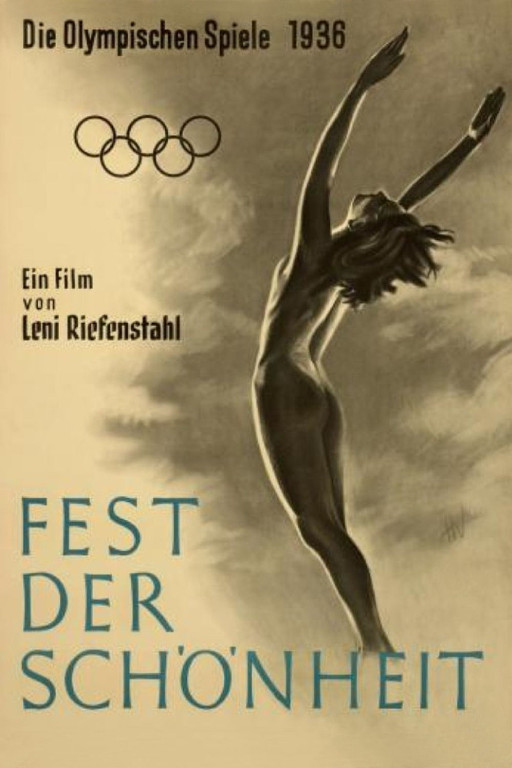 | Original title: Olympia 2. Teil - Fest der Schönheit |
| Year: 1938 | |
| Director: Leni Riefenstahl | |
| Duration: 96 min. | |
| Genres: Documentary, Sport |
Part two of the documentary focusses entirely on other sports. In similar ways to part 1, we now see athletes try their best in all sorts of sports, varying from cycling to swimming to fencing to horseback riding and many other events. One of the more interesting sports that is now part of the past was a pentathlon-like event, which consisted of horseback riding, shooting a hand gun, running and some other stuff I think they didn’t show. Both parts of Olympia also seem to follow a theme, which can be derived from their subtitles. Part 1 starts with 5 minutes of footage from ancient Greek ruins, and the opening ceremony. The Olympics are a feast for the people. Part two opens with comment-less footage from the men’s gymnastics event. Festival of Beauty celebrates the perfection of the (Aryan) male body. If you’re interested in the history of sports or the Olympics, be sure to watch this. There’s hardly anything in these three plus hours of documentary that is terribly offensive. It’s mostly a Fest für die Augen, a beautiful display of practicing sports in days gone by.
Ze list!
Hasta la lista, baby!
| short: At Land: |  (7.7 / 10) (7.7 / 10) |
| short: Du côté de la côte: |  (6.2 / 10) (6.2 / 10) |
| short: Le lion volatil: |  (6.2 / 10) (6.2 / 10) |
| "short:: |  (0.0 / 10) (0.0 / 10) |
| Laloux: |  (0.0 / 10) (0.0 / 10) |
| Sauvage: |  (0.0 / 10) (0.0 / 10) |
| Lotte: |  (0.0 / 10) (0.0 / 10) |
| Reiniger: |  (0.0 / 10) (0.0 / 10) |
| Fairy: |  (0.0 / 10) (0.0 / 10) |
| Tales: |  (0.0 / 10) (0.0 / 10) |
| 1-5: |  (0.0 / 10) (0.0 / 10) |
| shorts: Lotte Reiniger Fairy Tales 6-10: |  (6.1 / 10) (6.1 / 10) |
| doc: Evaporating Borders: |  (7.1 / 10) (7.1 / 10) |
| doc: Indie Game: The Movie: |  (7.2 / 10) (7.2 / 10) |
| doc: Olympia I - Festival of the Nations: |  (7.4 / 10) (7.4 / 10) |
| doc: Olympia II - Festival of Beauty: |  (7.4 / 10) (7.4 / 10) |
| "doc:: |  (0.0 / 10) (0.0 / 10) |
| Triumph: |  (0.0 / 10) (0.0 / 10) |
| of: |  (0.0 / 10) (0.0 / 10) |
| the: |  (0.0 / 10) (0.0 / 10) |
| Will: |  (0.0 / 10) (0.0 / 10) |
| Psycho: |  (0.0 / 10) (0.0 / 10) |
| August Rush: |  (8.3 / 10) (8.3 / 10) |
| Born in Flames: |  (7.0 / 10) (7.0 / 10) |
| Despite the Falling Snow: |  (6.0 / 10) (6.0 / 10) |
| Documenteur: |  (6.8 / 10) (6.8 / 10) |
| Longing for the Rain: |  (6.0 / 10) (6.0 / 10) |
| Mädchen in Uniform: |  (8.2 / 10) (8.2 / 10) |
| Manuela Jankovic's War: |  (6.0 / 10) (6.0 / 10) |
| Merrily We Go to Hell: |  (5.8 / 10) (5.8 / 10) |
| "Mikey: |  (0.0 / 10) (0.0 / 10) |
| and: |  (0.0 / 10) (0.0 / 10) |
| Nicky: |  (0.0 / 10) (0.0 / 10) |
| Summertime: |  (7.4 / 10) (7.4 / 10) |
| Terminal Island: |  (6.6 / 10) (6.6 / 10) |
| Testament: |  (7.3 / 10) (7.3 / 10) |
| The Bigamist: |  (6.4 / 10) (6.4 / 10) |
| The Devil from Seventh Grade: |  (5.7 / 10) (5.7 / 10) |
| The Diary of a Teenage Girl: |  (5.2 / 10) (5.2 / 10) |
| The Disobedient: |  (6.7 / 10) (6.7 / 10) |
| The Dressmaker: |  (7.4 / 10) (7.4 / 10) |
| The Dry Valley (Sukhodol): |  (7.4 / 10) (7.4 / 10) |
| The Hurt Locker: |  (7.8 / 10) (7.8 / 10) |
| The Lesson (Urok): |  (6.5 / 10) (6.5 / 10) |
| The Woman Condemned: |  (5.1 / 10) (5.1 / 10) |
| Three Cases of Murder (1st segment): |  (7.2 / 10) (7.2 / 10) |
| Thursday Till Sunday: |  (5.9 / 10) (5.9 / 10) |
| Wings: |  (8.2 / 10) (8.2 / 10) |
| Winter's Bone: |  (6.8 / 10) (6.8 / 10) |
